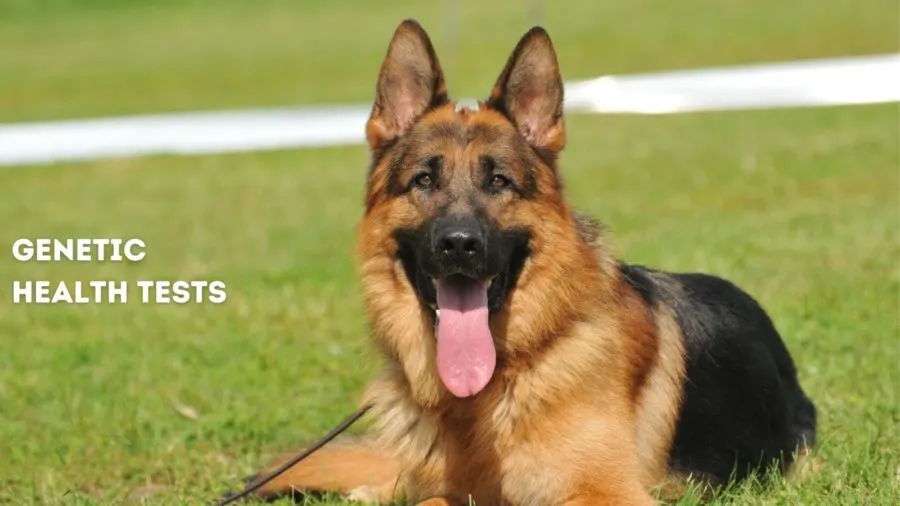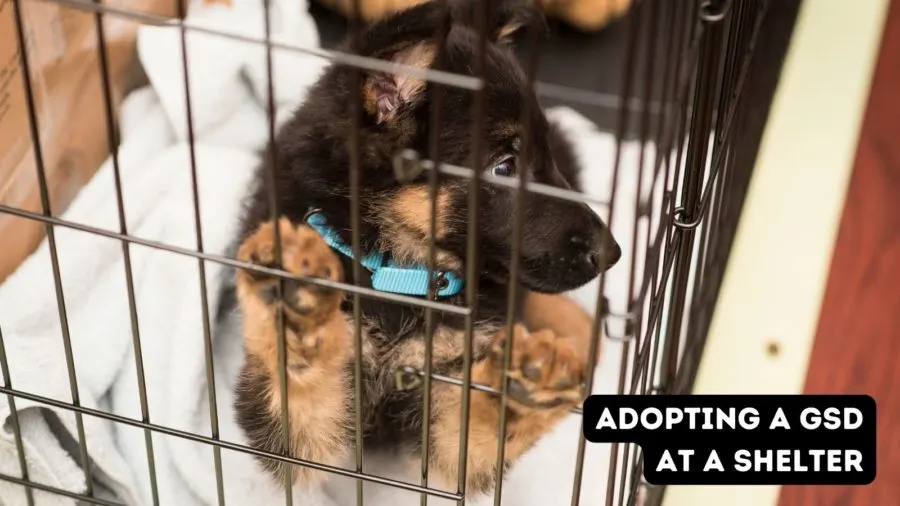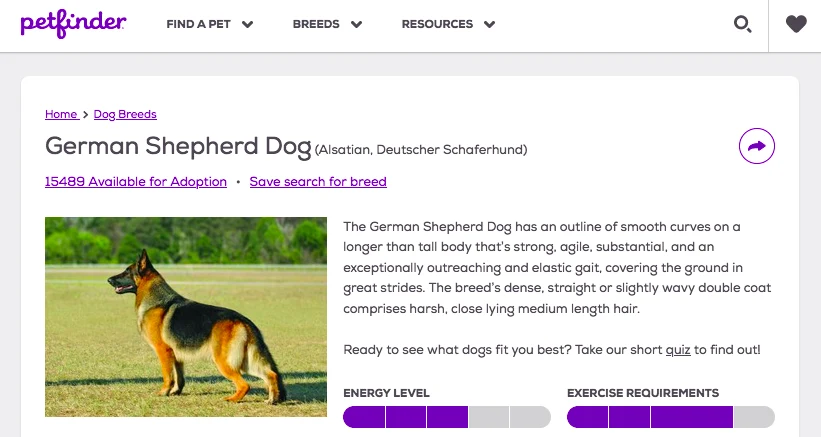Your heart is set on adding a German Shepherd Dog to your family–but how much will this cost? As with most things in life, the price can vary based on where you obtain the dog as well as where you live, the age of the dog and more. Let’s take a look at the price ranges for a German Shepherd puppy and adult dog at a breeder, breed specific rescue and a shelter–with the pros and cons of each.

What’s the German Shepherd Dog Price at a Breeder?
On average, German Shepherd puppies purchased from breeders cost anywhere from $500–$2,500 depending on their bloodline and age. This is the price for a “pet” German Shepherd puppy; prices for show dogs intended for dog shows and breeding will be more.
The price will depend on several factors:
- The genetic testing that has been done on the GSD puppy’s parents. The best GSD breeders will have dogs that have passed health screenings and have Canine Health Information Center (CHIC) numbers. Dogs can only be granted a CHIC number by taking mandatory health screenings. (You’ll find a list of the mandatory health screenings–and the optional screenings–in the health section below.)
- The location of the breeder. The rules of supply and demand pertain to dogs as well so larger metropolitan areas are often more expensive. The German Shepherd is one of the most popular dog breeds in the United States so that demand can translate into higher prices.
- The pedigree of the parents. German Shepherds that have participated in sanctioned competitions have more expensive litters.
- Whether the German Shepherd Dog is a show quality dog, a working dog line or a pet quality dog. Most breeders will require that pet quality dogs be spayed/neutered at the appropriate age. Show quality puppies with a future in competitive dog shows and breeding are more expensive.
- The age of the dog. Puppies are definitely more expensive than adults.
When you purchase a German Shepherd from a breeder, the price usually includes the dog’s registration papers and first set of puppy shots. Good breeders will also include a health guarantee.
When adopting from a breeder, it’s especially important to make sure you are adopting from a reputable breeder—not a backyard breeder and not an online seller. Below we’ll look at how you can be sure you are talking with a responsible GSD breeder.
Genetic Health Tests for German Shepherds

Be sure to ask about which tests and evaluations the puppy’s parents have undergone before you make your purchase.
GSDs are fairly healthy large dogs but like any breed there are orthopedic diseases that can be inherited—so reputable breeders will conduct testing on both parents to help ensure a healthy litter.
The German Shepherd Dog Club of America recommends these tests as mandatory for the parents of GSD puppies:
- The Orthopedic Foundation for Animals (OFA) or OVC evaluations for Hip Dysplasia. These tests can only be done on breeding dogs two years and older.
- The Orthopedic Foundation for Animals (OFA) or OVC evaluations for Elbow Dysplasia.
- Temperament test
The temperament test must be performed by an Evaluator approved by the German Shepherd Dog Club of America and test approaching the dog by a stranger, looking for confident dogs:
Along with the above tests, CHIC lists several optional tests that good breeders will have considered:
- Cardiac Evaluation
- Autoimmune thyroiditis
- ACVO Eye Exam
- Degenerative Myelopathy
What if you don’t have genetic testing on your GSD?
If your breeder had not run these genetic tests on your dog–or if you adopt a German Shepherd from a rescue or shelter, you can run the Embark Dog DNA Test using a simple saliva test you can perform at home. Currently the health testing costs under $200.
If you’ve adopted your GSD, the Embark test can also tell you if he or she is a purebred German Shepherd or a mix with other breeds and what those breeds are.
Embark tests for over 230 genetic diseases and conditions–including several of interest to GSD parents:
- Canine Leukocyte Adhesion Deficiency Type III, CLAD III (FERMT3, German Shepherd Variant): Canine Leukocyte Adhesion Deficiency (CLAD), type III is a genetic disorder that affects the ability of white blood cells to attach to other cells and tissues in the body, which can lead to serious infections. Dogs with CLAD, type III typically exhibit symptoms such as recurrent ear infections, skin infections, pneumonia, and other respiratory infections. There is currently no cure for CLAD, type III, so treatment focuses on managing the symptoms and preventing infection.
- Degenerative Myelopathy, DM (SOD1A): Degenerative myelopathy (DM) is a progressive neurologic disease of dogs that affects the spinal cord. Dogs with DM first lose coordination in their hind legs, then they lose muscle mass and eventually the ability to walk.
- Factor VIII Deficiency, Hemophilia A (tests for two German Shepherd variants): Hemophilia A is a genetic disorder that affects the blood’s ability to clot. It is caused by a lack of one of the proteins needed for blood to clot properly. Dogs with hemophilia A will often suffer from uncontrolled bleeding, most commonly into the joints.
- Hyperuricosuria and Hyperuricemia or Urolithiasis, HUU (SLC2A9): Hyperuricosuria is a condition in which dogs excrete excessive levels of uric acid in their urine. Uric acid is a waste product that is normally eliminated from the body through the kidneys. When the kidneys are not able to remove enough uric acid, it builds up in the blood and can cause health problems. Dogs with hyperuricosuria are at risk for developing bladder stones, kidney stones, and other health problems. Treatment for hyperuricosuria usually involves trying to reduce the amount of uric acid in the dog’s urine. This may be done by prescribing special diets or medications, or by surgically removing the dog’s bladder stones.
- MDR1 Drug Sensitivity (ABCB1): MDR1 (multi-drug resistance gene 1) is a gene that codes for a protein called P-glycoprotein. P-glycoprotein is involved in the transport of drugs and other molecules across cell membranes. Dogs that have a mutation in the MDR1 gene (often referred to as “MDR1 dogs”) are at risk for adverse reactions to certain drugs and toxins. Drugs that are known to cause adverse reactions in MDR1 dogs include digoxin, ivermectin, loperamide, and milbemycin. Signs of an adverse reaction to one of these drugs can include vomiting, diarrhea, decreased appetite, lethargy, impaired coordination, seizures, and even death
- Mucopolysaccharidosis Type VII, Sly Syndrome, MPS VII (GUSB Exon 3, German Shepherd Variant): Mucopolysaccharidosis (MPS) is a group of rare genetic diseases that result from the body’s inability to break down long chains of sugar molecules called mucopolysaccharides. There are several different types of MPS, each caused by a deficiency in a specific enzyme needed to break down mucopolysaccharides.
- Platelet Factor X Receptor Deficiency, Scott Syndrome (TMEM16F): Platelet Factor X (PF-X) receptor deficiency is a rare inherited disorder that affects dogs. It is caused by a genetic mutation that impairs the ability of the blood to clot properly. This can lead to frequent and sometimes severe bleeding events which can be difficult to control, even with the help of medications. Dogs with this condition are at an increased risk for bleeding and may require lifelong monitoring and medical management.
- Renal Cystadenocarcinoma and Nodular Dermatofibrosis, RCND (FLCN Exon 7): Renal Cystadenocarcinoma is a type of renal cancer that affects the kidneys. It is a relatively rare cancer, accounting for only 1-2% of all canine cancers. Symptoms include weight loss, decreased appetite, vomiting, and increased water consumption.
- X-linked Ectodermal Dysplasia, Anhidrotic Ectodermal Dysplasia, XHED (EDA Intron 8): X-linked ectodermal dysplasia is a disorder that affects the development of certain tissues in dogs. Affected dogs have problems with the development of their skin, hair, nails, and teeth. They may also have problems with sweating and the function of their tears and salivary glands. Dogs with this disorder usually have a very thin coat of hair, often with areas that are bald or have very thin hair. Their skin may be dry and cracked, and they may develop sores on their skin. Nails may be abnormally shaped or missing altogether, and teeth may be missing or poorly developed. Dogs with X-linked ectodermal dysplasia often experience overheating.
How to Find a Reputable German Shepherd Breeder
- Check the Regional Clubs page of the German Shepherd Dog Club of America website for a club in your area.
- Attend a sanctioned dog show and talk with breeders and competitors for recommendations.
- Ask your veterinarian for recommendations regarding reputable breeders.
Once you’ve found a few names, do an online search to learn more and narrow your list.
Search for “BREEDER NAME complaints” or “BREEDER NAME scam” to see if you find complaints. Are there any Better Business Bureau (BBB) complaints? Check the Facebook page of the breeder and read through the comments. (Remember, however, that comments can be deleted by the page owner.)
Talking to a GSD Breeder
Once you’ve narrowed your choice, it’s time to talk to the breeder:
- Ask for references. The breeder should be happy to share the name and contact information for customers.
- Ask questions. Lots of questions. The breeder should be happy to answer questions about the puppy, the puppy’s parents (and grandparents!), the socialization the puppy has received, the health tests and screening he has received and more. The breeder should be glad to share the test results from the health tests and screenings and should be happy to let you meet at least the mother (if not the sire as well) of the German Shepherd Dog puppies.
- Ask how often the dogs are bred. A breeder shouldn’t have GSD puppies for sale at all times; reputable breeders will selectively breed and only have puppies for sale occasionally.
- Ask to tour the kennels. Are they well maintained? Do the dogs look healthy? Beware of operations that will not let you tour the kennels and breeders that want to meet you in a parking lot to hand over the puppy.
- Be prepared for questions. The breeder should ask YOU questions as well; be suspicious if the breeder has no questions about your past history with pets, your living situation, etc. The breeder should want to know how much experience you have with herding breeds, what your training plans are and your plans for exercising the dog.
- Ask if the breeder will take the German Shepherd puppy–or adult dog–back if necessary. Reputable breeders should not only agree to accept the dog if it doesn’t work out or even upon your death—but require that the dog be returned to them for rehoming.
- Ask for a contract.VCA Animal Hospital recommends that the breeder “Provides a written contract with a guarantee of health allowing time for a pre-purchase examination by a veterinarian of your choice. If medical problems are diagnosed, the breeder should readily take the pup back and provide a full refund.”
- Ask for registration papers in your name. German Shepherd breeders may adopt out of the area but, nonetheless, you will want to go to the breeder to meet the parents, view the kennels and bring home your puppy in person. This will add to your expenses—but breeders that transport a puppy by air are putting the dog at risk.
If you want to buy a German Shepherd Dog from an online breeder, please think again. There are numerous scams; people spend thousands of dollars for a dog and never receive a puppy. AKC warns potential pet parents to be wary of any seller asking for payment by Venmo, in gift cards or as a wire transfer.
Sadly many dogs sold online and in pet shops are often the result of puppy mills, places where dogs live 24/7 in terrible conditions without human socialization and often with serious health issues. Dogs purchased from puppy mills can mean years of heartache and expensive veterinary care–and perpetuation of a cruel industry.
The pros of purchasing from a German Shepherd breeder:
- You may be able to select a puppy—including a choice of gender.
- You may obtain health screenings for the puppy’s parents.
- A reputable breeder will be passionate about German Shepherds and will a resource for years to come.
The cons of purchasing from a German Shepherd breeder
- You will pay far more for a cattle dog from a breeder than a rescue or shelter. If you find a breeder who has German Shepherd puppies for sale at prices much lower than you are seeing from other breeders, you must suspect you are dealing with a backyard breeder who has not done health screening, with an online seller who is operating a puppy mill or with someone who is running a scam. Beware.
- You will need to wait until puppies are available.
- You will need to do your own due diligence to select a reputable breeder.
What’s the Price of Adopting a German Shepherd Dog at a Breed Rescue?

German Shepherd Dogs in rescues are far less expensive that those at a breeder. Generally the price of a dog at a GSD rescue will range from $150-$400, depending on the location and the age of the dog. Puppies under a year old will be the most costly.
The AKC-affiliated rescue group for German Shepherds is the American German Shepherd Rescue Association (AGSRA). This group provides funding to a network of GSD rescues — they do not have dogs themselves for adoption. They have a list of affiliated rescues that can help located adoptable GSDs in your region.
A breed rescue is, like the name suggests, a pet rescue that is specifically for one breed of dog. You’ll find purebred German Shepherd Dogs, GSD mixes and probable GSDs at breed rescues.
These are generally small non-profit groups that operate through a foster system of volunteers who love the breed. Because of the time the dog spends in their home while waiting for adoption, the foster will be able to tell you about the dog’s personality, likes and dislikes–and what type of home this GSD would do best in.
German Shepherd rescues specialize in German Shepherds of all ages; some have primarily purebred German Shepherds while others may also have adoptable Belgian Malinois and Dutch Shepherds.
Some rescues will also include GSD mixes like the Golden Shepherd (German Shepherd and Golden Retriever), Shollie (German Shepherd and Collie mix) and more. You’ll even find rescues specifically for white German Shepherds.
When you find a GSD in a breed rescue, that puppy or dog will have received a long list of valuable services:
- Spay/neuter, in most cases
- Age appropriate shots
- Heartworm screening and monthly preventative
- De-worming
- Wellness visit
- Any veterinary care the dog may have required while waiting for adoption
The cost of these services, depending on your vet and the gender of your dog, could range from $300-500 if you went to purchase the same services.
How to Find Breed Rescues
Along with the list mentioned above, many breed rescues list their adoptable dogs on large adoption sites such as:
Search these sites by breed to see if breed rescues in your area have adoptables. If you find a potential match, you’ll then make an application directly to the rescue.
Breed rescues generally have more stringent adoption processes to ensure a good fit both for you and the GSD. Some may require a home visit and require a physical fence; most will want to do a veterinary check and a reference check with non-relatives.
The dogs that are up for adoption at German Shepherd rescues may be there for a variety of reasons:
- Death of an owner.
- Change in owner’s living situation.
- Owners that weren’t ready for the challenges of a large, active dog.
- Lost dogs that the rescue had seen on shelter websites.
- German Shepherds a breeder no longer wanted.
Whatever the reason, GSDs in rescue may or may not come with papers, depending on whether or not the dog was surrendered with papers.
The Pros of Adopting from a German Shepherd Rescue
- You will be saving a life. Most dogs at breed rescues are pulled from shelters, often open-intake shelters that may not be no-kill shelters.
- You will be able to adopt a German Shepherd or GSD mix for far less money than purchasing a dog from a breeder.
- You will be able to talk with people who are passionate about the breed about the individual dog you are interested in adopting.
- You will have a network of assistance to help with your questions as you acclimate a German Shepherd into your life.
The Cons of Adopting from a Breed Rescue
- You may or may not be able to find a German Shepherd puppy. Our most recent search brought up an 6-month-old GSD so it’s definitely a possibility due to the popularity of this breed.
- Unless the rescue knows the history of the dog, you most likely won’t know if the dog’s parents had the health screenings we discussed above.
- Your dog may or may not be a purebred and may or may not have papers. Some dogs are turned into breed rescue by owners who have papers and a full background on the dog, however.
What’s the Price of Adopting a German Shepherd at a Shelter?

The least expensive option when it comes to the price of a German Shepherd is a shelter, either a municipal animal shelter or a privately-operated shelter. Generally you can expect to pay $50-150 at a municipal shelter and $150-$300 at a privately-operated shelter.
Can you find a German Shepherd puppy at a municipal shelter? You sure can. When we were searching for a puppy before adopting Isla, we found a beautiful two-month-old GSD about two hours from us.
At a shelter or in online shelter listings, you are going to have to rely more on your knowledge of the GSD appearance than you would at a breed rescue. Shelters use their best judgement, often while intaking many dogs, so sometimes the accuracy of the breed is questionable. And a growing number of shelters don’t attempt to guess at the breed of a dog but instead label them as “mixed breed” in the listings.
To improve your chances of identifying a German Shepherd (especially a puppy, who will not have the trademark prick ears of a GSD), be sure to look though numerous photos of all ages of German Shepherds before you start your search.
Like dogs at breed rescues, most shelter dogs have seen a veterinarian and received a whole suite of treatments including spay/neuter, shots appropriate for their age, deworming, microchipping and more. Purchased separately, those services can range from about $350 to $500.
To locate a GSD or GSD mix at a shelter, call your local shelter or start your search online.
Petfinder’s German Shepherd Dog page will list the total number of adoptable GSDs currently in the database. Click on the link of adoptable dogs in the top left corner; you can then enter your zip code to see adoptables near you. The listings will include both rescues and shelters.

You can search for dogs by age and gender–and by distance (some shelters and rescues will adopt out of area).
As with adopting from a breed rescue, you’ll find that dogs have become homeless for a huge variety of reasons, often having nothing to do with the behavior of the dog but with changes to the owner’s living situation or lack of time to train and acclimate the dog properly.
Unlike adopting from a breed rescue, dogs at a shelter will generally be housed at the shelter (although an increasing number utilize foster homes whenever they can, especially for puppies). If the dog is housed at the shelter, you may not know a lot about his or her personality.
Talk with the shelter staff and ask if the dog has been temperament tested and if they can tell you if the dog is skittish, shy, outgoing, has any prior training, etc.
Ask the shelter if they have any background on the dogs; you may be surprised to find a puppy whose purebred mother came in as a pregnant stray dog and gave birth at the shelter. It definitely happens.
The Pros of Adopting a German Shepherd Dog from a Shelter
- You are saving a life, not only of the dog you adopt but of the next dog who will be rescued due to the kennel that is now clear.
- Your new dog will have received a long list of veterinary services.
- You will have the love of a dog whose price was far less than that of a dog from a breeder.
The Cons of Adopting a German Shepherd from a Shelter
- Your dog may or may not be a purebred or a German Shepherd mix.
- You most likely won’t know if the dog’s parents had the health screenings we discussed above.
- You may not know the history of the dog.
Can you find free German Shepherd puppies?
There is a chance you can locate free German Shepherd puppies in your area. Whether people are rehoming a puppy or looking for homes for an accidental litter, occasionally there are GSD puppies available at no charge.
Talk with German Shepherd owners in your area and let them know your interest; MeetUps and dog parks are a good place to meet fellow GSD lovers. Speak with your veterinarian and let her know your interest in a German Shepherd puppy.
There’s also a website called Home to Home; it’s used both by individuals and by partner shelters who work to keep pets who were being relinquished in their home until the owner can rehome the pet directly. You’ll set up an account then be able to contact the dog’s owner directly for more information.
You may also be able to find a free puppy through sites such as Craigslist and NextDoor.
Regardless of the route you take, you need to ask the previous owner for all veterinary records. Take this in consideration in regard to cost; the free dog very well may be far more expensive to you than a shelter or rescue dog because he may not have received appropriate vaccines, spay/neuter, etc. You may be adopting a dog that needs expensive veterinary care.
When rehoming a German Shepherd for free, some pet owners may include food, a leash, and even a dog bed along with the dog.
The pros of adopting a free German Shepherd puppy:
- You may save the dog from being relinquished to an uncertain future at an animal shelter or being dumped.
- You are saving money on the pet adoption.
The cons of adopting a free German Shepherd puppy:
- You will likely be adopting a puppy with uncertain veterinary history.
- You may spend far more on veterinary bills to get your puppy caught up on vaccines and vet care than you would if you adopted at a shelter or rescue.
FAQ
What is the cheapest price for a German Shepherd puppy?
The cheapest price for a GSD puppy is from a municipal shelter where they may be priced for $100 or less but will have received considerable veterinary care as compared to a “free” puppy from an individual.
Among purebred GSDs from a breeder, the cheapest are puppies without papers; this means the breeder did not perform the health screenings and temperament testings which could mean more expense in the long run.
Among colors, the least expensive will generally be the most common black and tan puppy. If you find low-cost purebred GSD listed online, please consider that you may be supporting a puppy mill.
Are male or female German Shepherds more expensive?
Both male and female German Shepherd dogs can be found for a variety of prices depending on the breeder, their bloodlines, and other factors. Generally speaking, male German Shepherd puppies may cost slightly more than female ones because they are larger in size and considered better guard dogs with higher energy levels.
What other expenses are related to German Shepherd Dogs?
Owning a German Shepherd comes with various miscellaneous costs that you should take into consideration. Besides the obvious expenses of food, vaccinations, and grooming, there are several other items that you will need to budget for. These include crates, beds, harnesses, name tags, collars, leashes, and toys, which can quickly add up in cost.
It’s important to note that due to their larger size, many of these items may be more expensive compared to those for smaller breeds. For instance, a dog bed designed for a Chihuahua will likely be significantly cheaper than one made for a Great Dane. So, when budgeting for a German Shepherd, it is crucial to consider these additional expenses associated with their specific needs and requirements.
Other Breeds to Consider
The Beagle Price: Breeders, Rescues & Shelters
What’s the Price of a Blue Heeler?
The Australian Shepherd Price Tag: How Much Does an Aussie Cost?
Pin it to remember the Price of a German Shepherd Puppy

- Review: Jimmy BX7 Pro Anti-Mite Vacuum Cleaner - December 16, 2024
- 🎉 GIVEAWAY: Lord of the Pets Portrait of Your Dog! - November 26, 2024
- Review: Lord of the Pets Portraits - November 17, 2024
